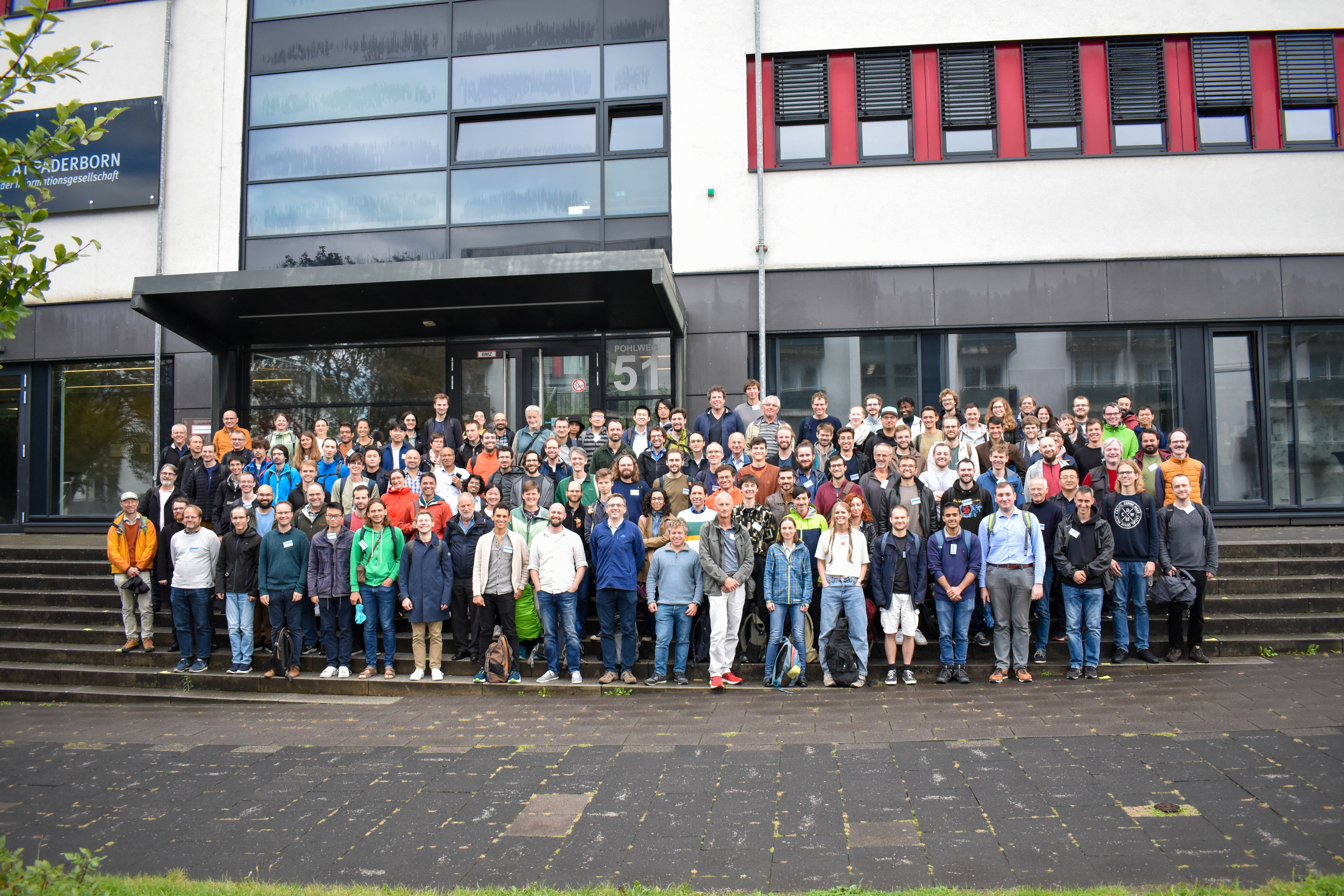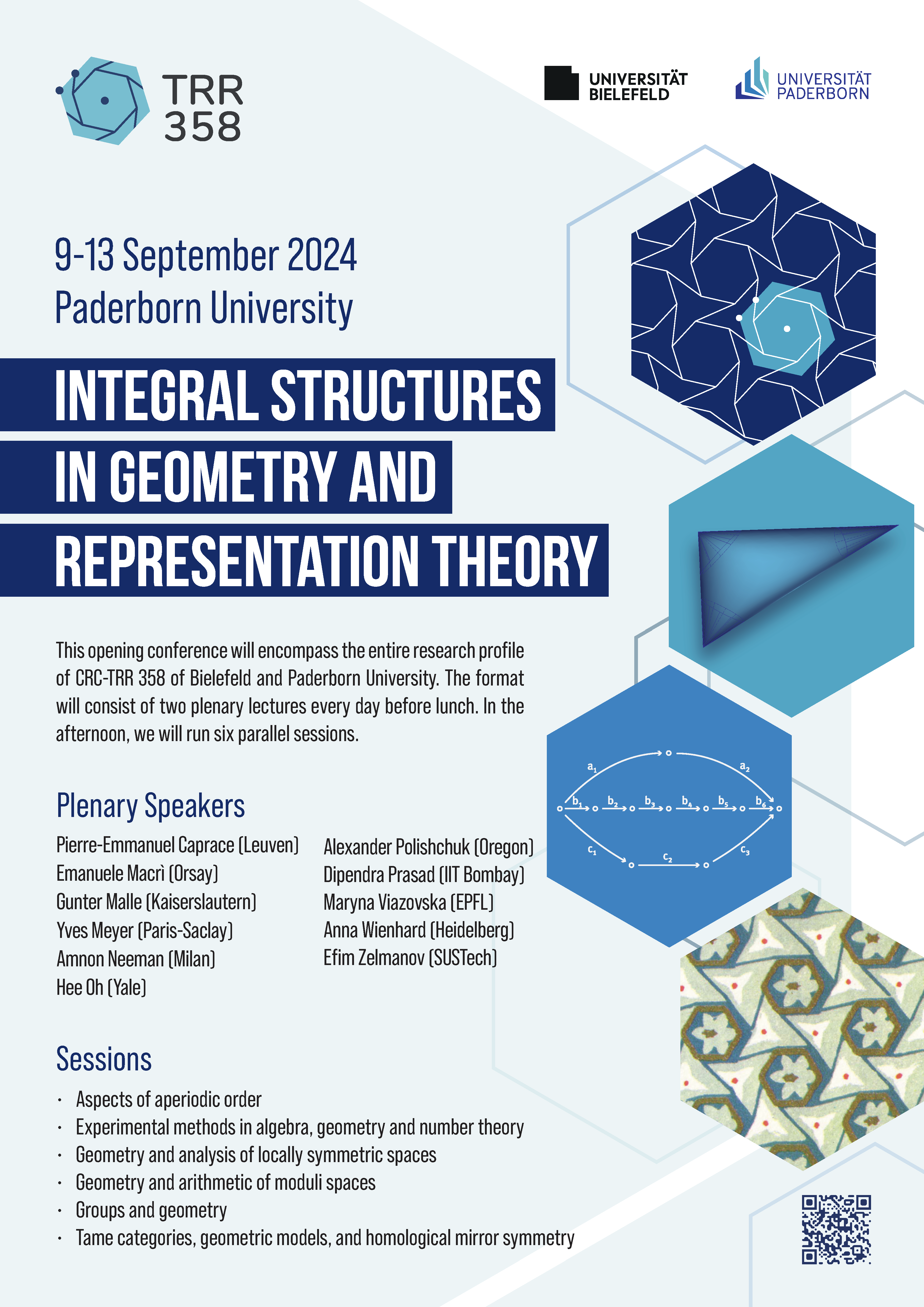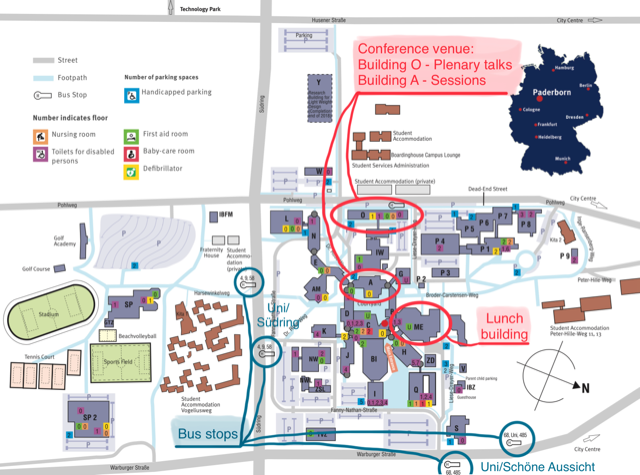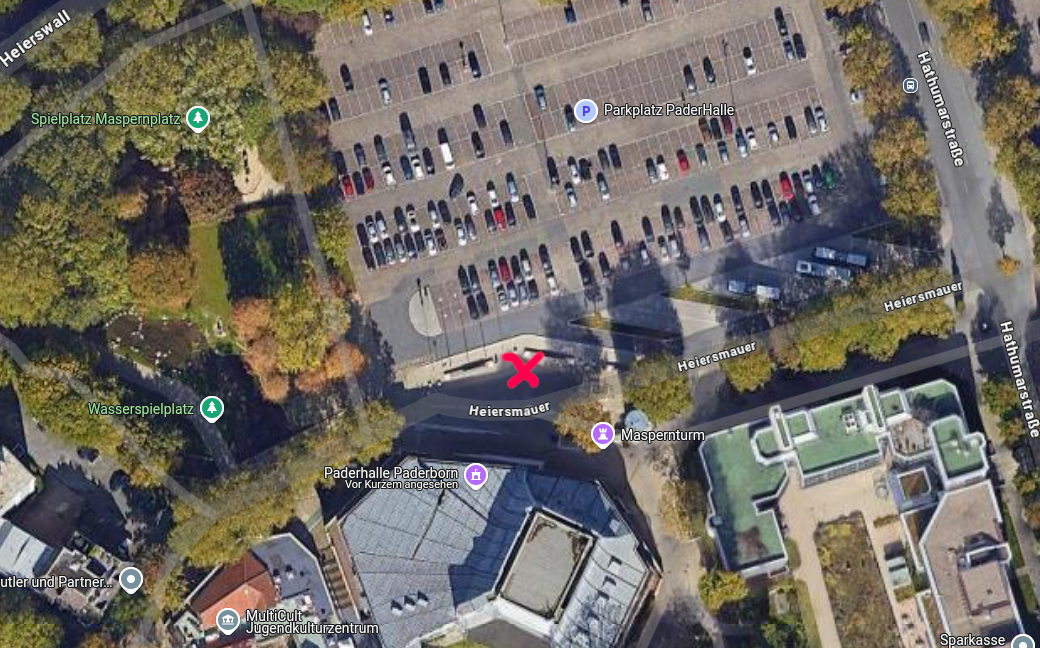Integral Structures in Geometry and Representation Theory


Paderborn, 9-13 September 2024
This opening conference will encompass the entire research profile of CRC-TRR 358 of Bielefeld and Paderborn University. The format will consist of two plenary lectures every day before lunch. In the afternoon, we will run six parallel sessions.
The conference is organised by Claudia Alfes, Igor Burban, Kai-Uwe Bux, Charles Vial and Tobias Weich.
The registration is closed.
The conference is organised by Claudia Alfes, Igor Burban, Kai-Uwe Bux, Charles Vial and Tobias Weich.
The registration is closed.
Plenary speakers
|
Emanuele Macrì (Orsay) Gunter Malle (Kaiserslautern) Amnon Neeman (Milan) |
Alexander Polishchuk (Oregon) Dipendra Prasad (Mumbai) Maryna Viazovska (Lausanne) |
Eva Viehmann (Münster) Anna Wienhard (MPI MiS Leipzig) Efim Zelmanov (SUSTech) |
Sessions
Sponsors




Contact
If you have any questions, please contact Elena Tielker: coordinator_trr358@math.uni-bielefeld.de.
Programme
Schedule
| Monday | Tuesday | Wednesday | Thursday | Friday | |
|---|---|---|---|---|---|
| 8.15 – 9.00 | Registration Foyer O1 |
||||
| 9.00 – 9.15 | Opening O1 and O2 |
||||
| 9.15 – 10.15 | Amnon Neeman O1 and O2 |
Alexander Polishchuk O1 and O2 |
Maryna Viazovska O1 and O2 |
Gunter Malle O1 and O2 |
Anna Wienhard O1 and O2 |
| 10.15 – 11.00 | Coffee break O1 258 and O1 224 |
||||
| 11.00 – 12.00 | Eva Viehmann O1 and O2 |
Efim Zelmanov O1 and O2 |
Dipendra Prasad O1 and O2 |
Emanuele Macrì O1 and O2 |
Sessions |
| 12.00 – 14.00 | Lunch break | ||||
| 14.00 – 16.00 | Sessions | Sessions | |||
| 15:00: Social programme | |||||
| 16.00 – 16.30 | Coffee break O1 258 and O1 224 |
Coffee break O1 258 and O1 224 |
|||
| 16.30 – 18.00 | Sessions | Sessions | |||
| 19:00 | Dinner Welcome Hotel |
||||
Abstracts
Emanuele Macrì: Hyper-Kähler manifolds and Lagrangian fibrations
A hyper-Kähler manifold is a complex Kähler manifold that is simply connected, compact, and has a unique holomorphic symplectic form, up to constants. This important class of manifolds has been studied in the past in many contexts, from an arithmetic, algebraic, geometric point of view, and in applications to physics and dynamics.
The theory in dimension two, namely K3 surfaces, is well understood. The aim of this talk is to give an introduction to the theory of hyper-Kähler manifolds in higher dimension, from a point of view of their classification; in particular, about existence of Lagrangian fibrations. We will present some results in dimension four, obtained in collaboration with Olivier Debarre, Daniel Huybrechts and Claire Voisin.
A hyper-Kähler manifold is a complex Kähler manifold that is simply connected, compact, and has a unique holomorphic symplectic form, up to constants. This important class of manifolds has been studied in the past in many contexts, from an arithmetic, algebraic, geometric point of view, and in applications to physics and dynamics.
The theory in dimension two, namely K3 surfaces, is well understood. The aim of this talk is to give an introduction to the theory of hyper-Kähler manifolds in higher dimension, from a point of view of their classification; in particular, about existence of Lagrangian fibrations. We will present some results in dimension four, obtained in collaboration with Olivier Debarre, Daniel Huybrechts and Claire Voisin.
Gunter Malle: Modular representations of finite reductive groups
We will give an overview of current problems and recent results in the representation theory of finite groups of Lie type in non-defining characteristic. These concern the block theory, the shape and precise form of decomposition matrices as well as the application to various conjectures in the field.
We will give an overview of current problems and recent results in the representation theory of finite groups of Lie type in non-defining characteristic. These concern the block theory, the shape and precise form of decomposition matrices as well as the application to various conjectures in the field.
Amnon Neeman: Excellent metrics on triangulated categories
The talk will expose recent results, still in progress, which explore the right restrictions to impose on metrics on triangulated categories for them to be particularly well-behaved.
We will begin with a historical survey: Rickard proved, back in 1989, that a pair of coherent rings $R$ and $S$ have the property that $D^b(\text{proj } R)=D^b(\text{proj } S)$ if and only if $D^b(\text{mod } R)=D^b(\text{mod } S)$. Krause asked, in 2018, if there is recipe that constructs $D^b(\text{mod } R)$ out of $D^b(\text{proj } R)$. I will briefly review the work that was done in 2018 - including a paper by myself, introducing good metrics on triangulated categories.
And then we will fast-forward, explaining the recent progress and its motivation.
The talk will expose recent results, still in progress, which explore the right restrictions to impose on metrics on triangulated categories for them to be particularly well-behaved.
We will begin with a historical survey: Rickard proved, back in 1989, that a pair of coherent rings $R$ and $S$ have the property that $D^b(\text{proj } R)=D^b(\text{proj } S)$ if and only if $D^b(\text{mod } R)=D^b(\text{mod } S)$. Krause asked, in 2018, if there is recipe that constructs $D^b(\text{mod } R)$ out of $D^b(\text{proj } R)$. I will briefly review the work that was done in 2018 - including a paper by myself, introducing good metrics on triangulated categories.
And then we will fast-forward, explaining the recent progress and its motivation.
Alexander Polishchuk: Schwartz spaces associated with the stack of rank $2$ bundles on a curve over a local field
This talk is based on joint works with Alexander Braverman and David Kazhdan. The motivation for this project comes from the Analytic Langlands program, which is an analog of the usual Langlands correspondence involving a curve over a local field. We study the natural Schwartz space of half-densities associated with the stack of rank $2$ bundles on such a curve. The long term goal is to understand the action of Hecke operators on this space. For this it is useful to understand the behavior of elements of this space near stable bundles. Our first result is that a Schwartz half-density on the stack of rank $2$ bundles defines a smooth (locally constant in the non-archimedean case) half-density on the open subscheme of very stable bundles, i.e., bundles without nonzero nilpotent Higgs fields. We then formulate a set of algebro-geometric conjectures (that we can check for low genus) that imply boundedness of these half-densities near stable bundles.
This talk is based on joint works with Alexander Braverman and David Kazhdan. The motivation for this project comes from the Analytic Langlands program, which is an analog of the usual Langlands correspondence involving a curve over a local field. We study the natural Schwartz space of half-densities associated with the stack of rank $2$ bundles on such a curve. The long term goal is to understand the action of Hecke operators on this space. For this it is useful to understand the behavior of elements of this space near stable bundles. Our first result is that a Schwartz half-density on the stack of rank $2$ bundles defines a smooth (locally constant in the non-archimedean case) half-density on the open subscheme of very stable bundles, i.e., bundles without nonzero nilpotent Higgs fields. We then formulate a set of algebro-geometric conjectures (that we can check for low genus) that imply boundedness of these half-densities near stable bundles.
Dipendra Prasad: Homological aspects of the branching problem: GGP for $p$-adics.
Branching laws for (complex) representations of groups describe how a representation of a group $G$ decomposes when restricted to a subgroup $H$ which in the case of compact groups is a direct sum of irreducible representations. When dealing with infinite dimensional representations of a $p$-adic group $G$ restricted to a subgroup $H$, the branching laws, as they are usually studied in the subject — and make up a large body of works in the subject — describe irreducible representations of $H$ which arise as a quotient representation. It is not clear if this allows one to describe how an irreducible representation of $G$ restricted to $H$ looks like. Homological algebra methods suggest thinking not only about $\text{Hom}_H(\pi_1,\pi_2)$, but also $\text{Ext}^i_H(\pi_1,\pi_2)$, and $\text{EP}_H(\pi_1,\pi_2)$. The lecture is an attempt to discuss some of these questions.
Branching laws for (complex) representations of groups describe how a representation of a group $G$ decomposes when restricted to a subgroup $H$ which in the case of compact groups is a direct sum of irreducible representations. When dealing with infinite dimensional representations of a $p$-adic group $G$ restricted to a subgroup $H$, the branching laws, as they are usually studied in the subject — and make up a large body of works in the subject — describe irreducible representations of $H$ which arise as a quotient representation. It is not clear if this allows one to describe how an irreducible representation of $G$ restricted to $H$ looks like. Homological algebra methods suggest thinking not only about $\text{Hom}_H(\pi_1,\pi_2)$, but also $\text{Ext}^i_H(\pi_1,\pi_2)$, and $\text{EP}_H(\pi_1,\pi_2)$. The lecture is an attempt to discuss some of these questions.
Maryna Viazovska: Random lattices with symmetries
What is the densest lattice sphere packing in the $d$-dimensional Euclidean space? In this talk we will investigate this question as dimension $d$ goes to infinity and we will focus on the lower bounds for the best packing density, or in other words on the existence results. I will give a historical overview of the existence of dense lattice packings by H. Minkowski, E. Hlawka, C. L. Siegel, C. A. Rogers, and more recently by S. Vance and A. Venkatesh. For a long time the best asymptotic lower bounds on packing density were known for lattice packings. Recently, a new asymptotic lower bound for sphere packings in high dimensions was proven by M. Campos, M. Jensen, M. Michelin, and J. Sahasrabudhe. This new bound is proven by a combinatorial method and a dense packing guaranteed by their theorem is not necessarily a lattice packing. In the final part of the lecture I will present a recent work done in collaboration with V. Serban and N. Gargava, and Ilaria Viglino on the moments of the number of lattice points in a bounded set for random lattices constructed from a number field.
What is the densest lattice sphere packing in the $d$-dimensional Euclidean space? In this talk we will investigate this question as dimension $d$ goes to infinity and we will focus on the lower bounds for the best packing density, or in other words on the existence results. I will give a historical overview of the existence of dense lattice packings by H. Minkowski, E. Hlawka, C. L. Siegel, C. A. Rogers, and more recently by S. Vance and A. Venkatesh. For a long time the best asymptotic lower bounds on packing density were known for lattice packings. Recently, a new asymptotic lower bound for sphere packings in high dimensions was proven by M. Campos, M. Jensen, M. Michelin, and J. Sahasrabudhe. This new bound is proven by a combinatorial method and a dense packing guaranteed by their theorem is not necessarily a lattice packing. In the final part of the lecture I will present a recent work done in collaboration with V. Serban and N. Gargava, and Ilaria Viglino on the moments of the number of lattice points in a bounded set for random lattices constructed from a number field.
Eva Viehmann: Affine Deligne-Lusztig varieties beyond the fully Hodge-Newton decomposable case
Affine Deligne-Lusztig varieties are a class of subschemes of affine flag varieties that play an important role in the description of the reduction modulo p of Shimura varieties. However, a complete description of their geometry is only available in very few cases, under the so-called fully Hodge-Newton decomposablility condition. I will explain how to relax this condition, still obtaining a good description of the geometry of the associated ADLV.
This is ongoing work with Xuhua He and Felix Schremmer.
Affine Deligne-Lusztig varieties are a class of subschemes of affine flag varieties that play an important role in the description of the reduction modulo p of Shimura varieties. However, a complete description of their geometry is only available in very few cases, under the so-called fully Hodge-Newton decomposablility condition. I will explain how to relax this condition, still obtaining a good description of the geometry of the associated ADLV.
This is ongoing work with Xuhua He and Felix Schremmer.
Anna Wienhard: A beautiful world beyond hyperbolic geometry: Anosov representations and higher Teichmüller spaces
I will describe the beautiful world of discrete subgroups of Lie groups of higher rank, taking inspiration from and making connection to hyperbolic geometry.
I will describe the beautiful world of discrete subgroups of Lie groups of higher rank, taking inspiration from and making connection to hyperbolic geometry.
Efim Zelmanov: Superconformal algebras
In 80s physicists searched for proper superextensions of the celebrated Virasoro algebra. The resulting structures became known as superconformal algebras and attracted a lot of attention. We will discuss representations, cohomologies and further generalisations of superconformal algebras.
In 80s physicists searched for proper superextensions of the celebrated Virasoro algebra. The resulting structures became known as superconformal algebras and attracted a lot of attention. We will discuss representations, cohomologies and further generalisations of superconformal algebras.
Sessions
Social programme
Details regarding meeting points and other logistical information will be provided on this website shortly before the conference begins. Additionally, all relevant information will be displayed at the conference venue.
Guided tour
Heinz-Nixdorf museum
Hike
Location
The conference will take place at the main campus of Paderborn University. The plenary talks take place in Building O, in the lecture halls O1 and O2, the sessions in the afternoon are held in Buildings O and A. The coffee breaks take place in Building O, in rooms O1.224 and O1.258.
The registration takes place in the foyer O1 in Building O.
The registration takes place in the foyer O1 in Building O.
How to get there
Bus:
It is possible to reach the campus from the city center by foot in roughly 30 minutes or alternatively by bus in about 15 minutes. Tickets can be purchasedon the bus (only cash)
at many busstations (including main station),
online at shop.padersprinter.de (creditcard payment).
The bus stops close to the campus are "Uni/Südring" and "Uni/Schöne Aussicht" and are indicated in the map below.
Train stations and airports:
The nearest train stations are Paderborn Hauptbahnhof (main station) and Paderborn Kasseler Tor (regional train to/from Bielefeld). By air, Paderborn is served by Paderborn-Lippstadt (PAD, 20km, 20 minutes by bus), Hannover (HAJ, 130km, 2h10 direct S-Bahn) and Düsseldorf (DUS, 160km, 2h02 direct regional train). Frankfurt Airport (FRA) is about 3 hours by train and requires at least one connection (in Kassel Wilhelmshöhe or Essen). Amsterdam Schiphol (AMS) is 4h30 by train with at least two connections.
It is possible to reach the campus from the city center by foot in roughly 30 minutes or alternatively by bus in about 15 minutes. Tickets can be purchased
Train stations and airports:
The nearest train stations are Paderborn Hauptbahnhof (main station) and Paderborn Kasseler Tor (regional train to/from Bielefeld). By air, Paderborn is served by Paderborn-Lippstadt (PAD, 20km, 20 minutes by bus), Hannover (HAJ, 130km, 2h10 direct S-Bahn) and Düsseldorf (DUS, 160km, 2h02 direct regional train). Frankfurt Airport (FRA) is about 3 hours by train and requires at least one connection (in Kassel Wilhelmshöhe or Essen). Amsterdam Schiphol (AMS) is 4h30 by train with at least two connections.


Accommodations
A limited number of rooms have been set aside at various hotels for participants. To access these contingents you need to contact the hotels directly by email:
Hotel Aspethera (Code: "UNI09092024-TRR358", until 17.6.2024)
Welcome Hotel (Code: "TRR 358", until 29.7.2024)
IBB Hotel (Code: "TRR 358", until 7.7.2024)
B&B Hotel (Code: "TRR 358", until 1.8.2024)
ibis Hotel (Link)
Child care
We offer child care for children from the age of one year during the conference from Monday, 9 September, to Friday, 13 September. The children will be supervised in the facility by qualified staff, assisted by Education Studies students.
If you are interested in this offer, please indicate this when registering.
If you are interested in this offer, please indicate this when registering.



Bicycle tour
We meet at 15:00
at the Paderborn bike station
Bahnhofstr. 36 (opposite the main railway station)
33102 Padernborn
Please be punctual and remember to wear appropriate clothing for the weather.